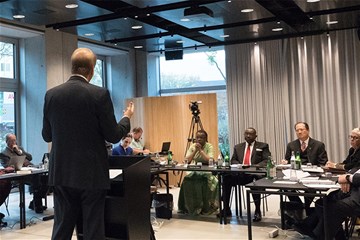The United Methodist Church's top court has clarified what parts of legislation heading to the 2019 General Conference pass constitutional muster.
Now it's up to plan supporters to decide how they will respond to the Judicial Council's ruling.
"Whether a piece of proposed legislation is a good idea or not, that's outside the purview of the Judicial Council," said the Rev. William B. Lawrence, former Judicial Council president and one of the United Methodists who filed a brief in the case.
"The Judicial Council is only authorized to rule on if something is constitutional as proposed legislation."
Put another way, the church court did not endorse any proposed legislation but instead ruled on whether the denomination's constitution allows General Conference to enact such legislation in the first place.
The Council of Bishops asked the Judicial Council to rule on the constitutionality of the three plans contained in the Commission on Way Forward report — the One Church, Traditional and Connectional Conference models.
Next February, a special General Conference in St. Louis will consider the proposals as well as any other petitions deemed "in harmony" with the call for the special session.
In Decision 1366, which was unanimous, the church court found most of the One Church Plan constitutional. The court identified more constitutional problems with petitions in the Traditional Plan.
Because the Connectional Conference Plan already includes eight proposed constitutional amendments, the Judicial Council ruled the plan fell outside its jurisdiction.
General Conference delegates who support the One Church and Traditional plans will have to decide whether they want to simply delete the parts deemed unconstitutional, transform those parts into potential constitutional amendments, or go in an entirely different direction.
Judicial Council found the 17 petitions in the One Church Plan to be constitutional, except for one individual sentence each in Petitions 4, 8 and 13.
Supporters were looking forward, now that the Judicial Council has ruled.
Of the plan's 17 petitions, the court ruled seven unconstitutional and identified unconstitutional portions in two others.
The group's delegates will be asked to approve a handful of resolutions, including one that endorses fundamental features and principles of a new Methodist denomination and authorizes creation of a working group to "envision a revitalized Methodist movement within and/or outside" The United Methodist Church.
The Council of Bishops expressed its gratitude. Bishop Kenneth H. Carter Jr., president of the council and Way Forward Commission moderator, quoted from the Commission on a Way Forward report in assessing the bishops' role at this point.
"We continue to be guided by two core convictions," he said in a statement. "We want to help the delegates to do their best work at the called General Conference, and we are seeking a way forward for the church that 'maximizes the presence of the United Methodist witness in as many places in the world as possible, that allows for as much contextual differentiation as possible, with a desire for as much unity as possible.'"
Heather Hahn and Sam Hodges, writers for United Methodist News Service, E Julu Swen, communicator in Liberia.
One of seven apportioned giving opportunities of The United Methodist Church, the General Administration Fund implements trustworthy administrative oversight, supports the legislative processes of the church and curates The United Methodist Church's rich history. Please encourage your leaders and congregations to support the General Administration Fund apportionment at 100 percent.
Your support of The General Administration Fund apportionment implements trustworthy administrative oversight like the General Conference sessions.





